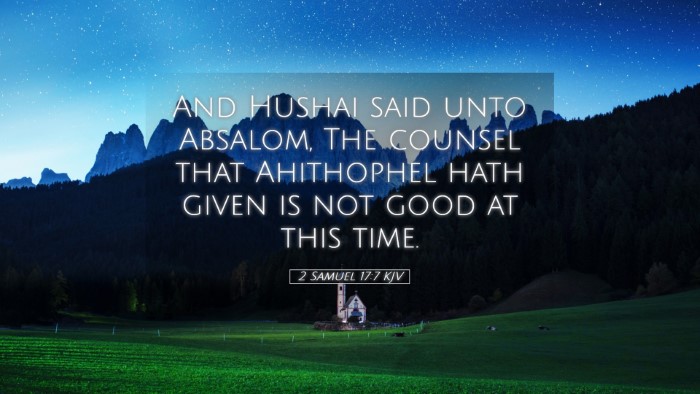Commentary on 2 Samuel 17:7
Verse Context: 2 Samuel 17:7 states, "But Hushai said to Absalom, 'The counsel that Ahithophel has given is not good at this time.'" This verse serves as a pivotal moment where Hushai, a faithful ally of David, seeks to counteract the advice of Ahithophel, a renowned counselor whose recommendations are typically sought after for their sharpness and insight.
Introduction
This commentary explores the complexities of political maneuvering, wisdom, and the sovereignty of God within the context of Absalom’s rebellion against his father, King David. The counsel offered in this chapter is critical as it not only reflects the human struggle for power but also highlights divine providence at work.
Insights from Matthew Henry
Human Counsel vs. Divine Wisdom: Matthew Henry emphasizes the importance of discerning between wise counsel and foolish advice. Hushai's statement demonstrates His awareness of the potential repercussions of Ahithophel's advice, which might lead to significant disaster for Absalom. Henry notes that Hushai was motivated by loyalty to David, seeking to protect him through shrewdness.
The Nature of Ahithophel's Counsel: Ahithophel's advice was characterized by its shrewdness and seeming invincibility. Henry points out that even well-founded arguments can lead to poor outcomes if they do not align with God's overarching plan. A comparison is drawn to how worldly wisdom, though often appearing right, may not align with divine principles.
Insights from Albert Barnes
Strategy in Political Counsel: Albert Barnes highlights the strategic mind of Hushai, who, upon observing Absalom's emotional state, realized that a different approach was necessary to turn him away from Ahithophel's counsel. Barnes explains how Hushai understood not only the political dynamics but also the personal characteristics of Absalom, which allowed him to tailor his advice effectively.
The Role of Timing: Barnes emphasizes the notion of timing in decisions. He articulates that while Ahithophel's advice might have been sound at another point in time, circumstances had changed drastically. Hushai’s ability to recognize this allowed him to offer counsel that was more adaptive to the current conditions of Absalom's kingship.
Insights from Adam Clarke
Influence of Counselors: Adam Clarke analyzes the profound influence of counselors and their wisdom on leadership. He states that Hushai's intervention illustrates the potential for a single individual to alter the course of events through wise counsel. Clarke draws attention to the fact that leaders must wisely choose their counselors, for their advice can significantly impact outcomes.
God’s Sovereignty: In his commentary, Clarke emphasizes the overarching theme of God’s sovereignty in human affairs. Even as Absalom and Ahithophel conspire, God remains in control. Clarke teaches that through Hushai's actions, God was maneuvering to preserve David's kingdom, reminding readers that no plan can succeed without God's acknowledgment.
Theological Reflections
The Complexity of Human Nature: The dialogue between Hushai and Absalom illustrates the intricate dynamics of human relationships and the struggle for power. This verse serves as a reminder that human ambitions often grant rise to conflicts, yet through them, God's will is continually worked out.
Providence in Adversity: The seeming chaos of Absalom's rebellion highlights a critical theological theme: God’s providence in adversity. Hushai’s counter-counsel serves as an instrument of divine intervention. It illustrates how God works through human agents, often in unexpected ways, to achieve His purposes.
Application for Today’s Leaders
- The Importance of Wise Counsel: Leaders are encouraged to seek wise counsel and learn to discern between what appears to be sound advice and what aligns with God’s purposes.
- The Need for Adaptability: Understanding the context in which decisions are made is crucial for effective leadership. Like Hushai, leaders must remain aware of shifts in circumstances and adjust their strategies accordingly.
- Trusting God’s Sovereignty: In moments of uncertainty or rebellion within a community or organization, leaders should trust in God’s sovereign control. He is present even in turbulent times, guiding His people toward His intended outcomes.
Conclusion
2 Samuel 17:7 encapsulates a moment laden with political intrigue, divine purpose, and human folly. Through the veil of these dynamics, we gain insight into the profound relationship between divine sovereignty and human action. As students of the Word, it invites us to contemplate the ways in which God orchestrates His will through the intricacies of life, even amidst turmoil and conflict.


